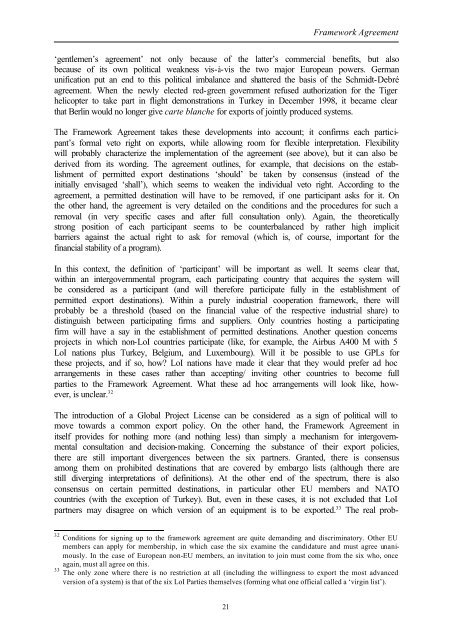A common European export policy for defence and dual-use items?
A common European export policy for defence and dual-use items?
A common European export policy for defence and dual-use items?
You also want an ePaper? Increase the reach of your titles
YUMPU automatically turns print PDFs into web optimized ePapers that Google loves.
Framework Agreement<br />
‘gentlemen’s agreement’ not only beca<strong>use</strong> of the latter’s commercial benefits, but also<br />
beca<strong>use</strong> of its own political weakness vis-à-vis the two major <strong>European</strong> powers. German<br />
unification put an end to this political imbalance <strong>and</strong> shattered the basis of the Schmidt-Debré<br />
agreement. When the newly elected red-green government ref<strong>use</strong>d authorization <strong>for</strong> the Tiger<br />
helicopter to take part in flight demonstrations in Turkey in December 1998, it became clear<br />
that Berlin would no longer give carte blanche <strong>for</strong> <strong>export</strong>s of jointly produced systems.<br />
The Framework Agreement takes these developments into account; it confirms each participant’s<br />
<strong>for</strong>mal veto right on <strong>export</strong>s, while allowing room <strong>for</strong> flexible interpretation. Flexibility<br />
will probably characterize the implementation of the agreement (see above), but it can also be<br />
derived from its wording. The agreement outlines, <strong>for</strong> example, that decisions on the establishment<br />
of permitted <strong>export</strong> destinations ‘should’ be taken by consensus (instead of the<br />
initially envisaged ‘shall’), which seems to weaken the indivi<strong>dual</strong> veto right. According to the<br />
agreement, a permitted destination will have to be removed, if one participant asks <strong>for</strong> it. On<br />
the other h<strong>and</strong>, the agreement is very detailed on the conditions <strong>and</strong> the procedures <strong>for</strong> such a<br />
removal (in very specific cases <strong>and</strong> after full consultation only). Again, the theoretically<br />
strong position of each participant seems to be counterbalanced by rather high implicit<br />
barriers against the actual right to ask <strong>for</strong> removal (which is, of course, important <strong>for</strong> the<br />
financial stability of a program).<br />
In this context, the definition of ‘participant’ will be important as well. It seems clear that,<br />
within an intergovernmental program, each participating country that acquires the system will<br />
be considered as a participant (<strong>and</strong> will there<strong>for</strong>e participate fully in the establishment of<br />
permitted <strong>export</strong> destinations). Within a purely industrial cooperation framework, there will<br />
probably be a threshold (based on the financial value of the respective industrial share) to<br />
distinguish between participating firms <strong>and</strong> suppliers. Only countries hosting a participating<br />
firm will have a say in the establishment of permitted destinations. Another question concerns<br />
projects in which non-LoI countries participate (like, <strong>for</strong> example, the Airbus A400 M with 5<br />
LoI nations plus Turkey, Belgium, <strong>and</strong> Luxembourg). Will it be possible to <strong>use</strong> GPLs <strong>for</strong><br />
these projects, <strong>and</strong> if so, how? LoI nations have made it clear that they would prefer ad hoc<br />
arrangements in these cases rather than accepting/ inviting other countries to become full<br />
parties to the Framework Agreement. What these ad hoc arrangements will look like, however,<br />
is unclear. 32<br />
The introduction of a Global Project License can be considered as a sign of political will to<br />
move towards a <strong>common</strong> <strong>export</strong> <strong>policy</strong>. On the other h<strong>and</strong>, the Framework Agreement in<br />
itself provides <strong>for</strong> nothing more (<strong>and</strong> nothing less) than simply a mechanism <strong>for</strong> intergovernmental<br />
consultation <strong>and</strong> decision-making. Concerning the substance of their <strong>export</strong> policies,<br />
there are still important divergences between the six partners. Granted, there is consensus<br />
among them on prohibited destinations that are covered by embargo lists (although there are<br />
still diverging interpretations of definitions). At the other end of the spectrum, there is also<br />
consensus on certain permitted destinations, in particular other EU members <strong>and</strong> NATO<br />
countries (with the exception of Turkey). But, even in these cases, it is not excluded that LoI<br />
partners may disagree on which version of an equipment is to be <strong>export</strong>ed. 33 The real prob-<br />
32 Conditions <strong>for</strong> signing up to the framework agreement are quite dem<strong>and</strong>ing <strong>and</strong> discriminatory. Other EU<br />
members can apply <strong>for</strong> membership, in which case the six examine the c<strong>and</strong>idature <strong>and</strong> must agree unanimously.<br />
In the case of <strong>European</strong> non-EU members, an invitation to join must come from the six who, once<br />
again, must all agree on this.<br />
33 The only zone where there is no restriction at all (including the willingness to <strong>export</strong> the most advanced<br />
version of a system) is that of the six LoI Parties themselves (<strong>for</strong>ming what one official called a ‘virgin list’).<br />
21
















